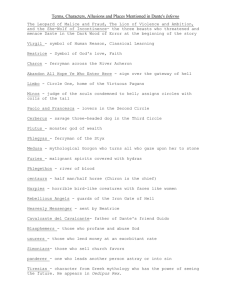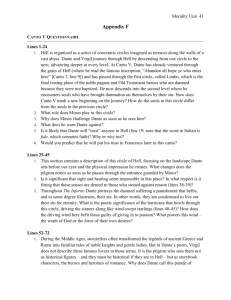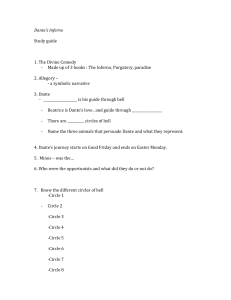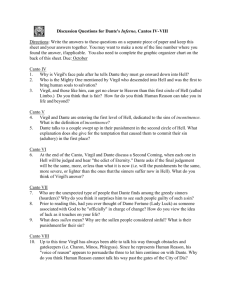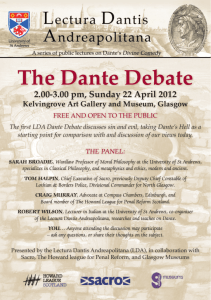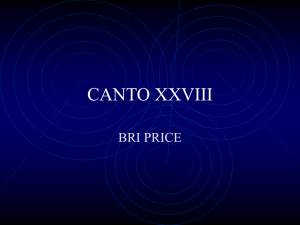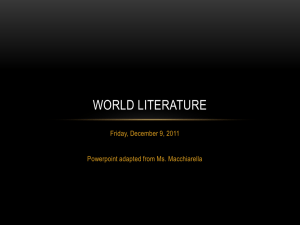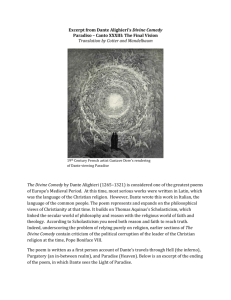Document
advertisement
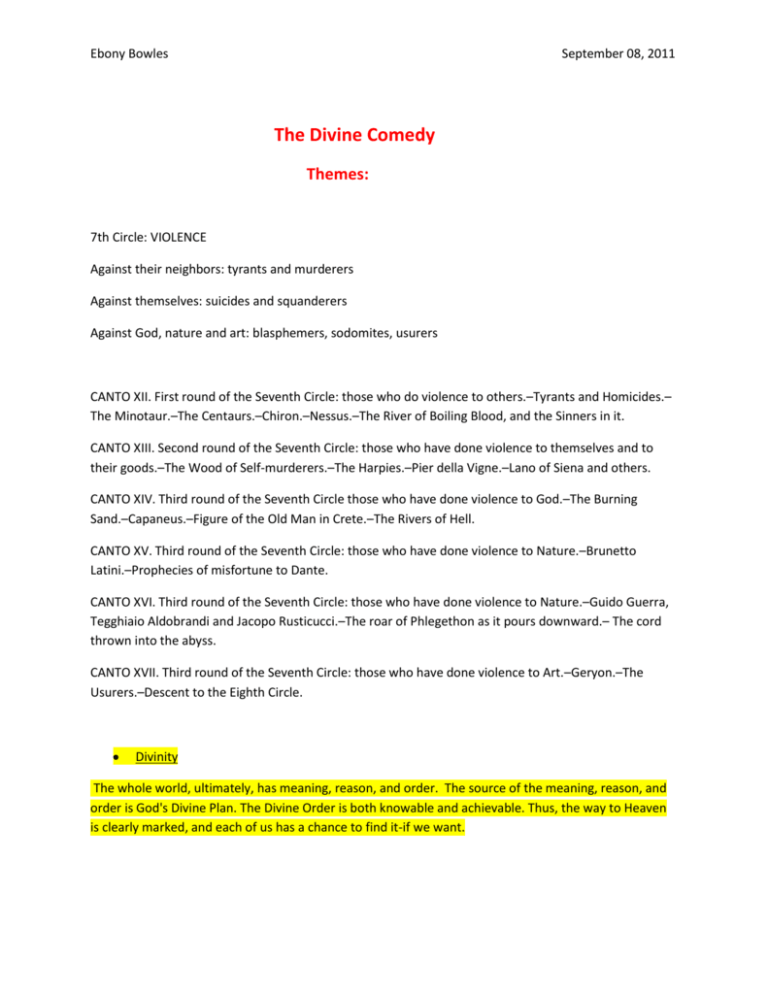
Ebony Bowles September 08, 2011 The Divine Comedy Themes: 7th Circle: VIOLENCE Against their neighbors: tyrants and murderers Against themselves: suicides and squanderers Against God, nature and art: blasphemers, sodomites, usurers CANTO XII. First round of the Seventh Circle: those who do violence to others.–Tyrants and Homicides.– The Minotaur.–The Centaurs.–Chiron.–Nessus.–The River of Boiling Blood, and the Sinners in it. CANTO XIII. Second round of the Seventh Circle: those who have done violence to themselves and to their goods.–The Wood of Self-murderers.–The Harpies.–Pier della Vigne.–Lano of Siena and others. CANTO XIV. Third round of the Seventh Circle those who have done violence to God.–The Burning Sand.–Capaneus.–Figure of the Old Man in Crete.–The Rivers of Hell. CANTO XV. Third round of the Seventh Circle: those who have done violence to Nature.–Brunetto Latini.–Prophecies of misfortune to Dante. CANTO XVI. Third round of the Seventh Circle: those who have done violence to Nature.–Guido Guerra, Tegghiaio Aldobrandi and Jacopo Rusticucci.–The roar of Phlegethon as it pours downward.– The cord thrown into the abyss. CANTO XVII. Third round of the Seventh Circle: those who have done violence to Art.–Geryon.–The Usurers.–Descent to the Eighth Circle. Divinity The whole world, ultimately, has meaning, reason, and order. The source of the meaning, reason, and order is God's Divine Plan. The Divine Order is both knowable and achievable. Thus, the way to Heaven is clearly marked, and each of us has a chance to find it-if we want. Ebony Bowles September 08, 2011 Human Reason The soul of Pier delle Vigne explains to Dante and Virgil that at the second judgment of all souls, which occurs at the end of time, those who have committed the isn of suicide will regain their bodies but not to wear because it is not just that a man have what he takes from himself. Literature/Mythology/Bible The seventh circle, where the violent are punished, is guarded by the Minotaur, half man half bull. He thrashes about violently while biting himself when the Poets pass him. Centaurs, half men half horses, guard the souls of the first ring of the seventh circle, who are guilty of committing violence against their fellowman. Virgil says the source of all the waters of Hell is a spring within a giant mountain of a man, who stands on the island of Crete. His head is made of gold, his arms and breast of silver, his abdomen of brass, his legs and left foot of iron, and his right foot, upon which he leans, of baked clay. This image is taken from the Bible and is an allegory of the history of the human race. The four metals represent the four ages of man, and the iron and clay feet represent secular and spiritual authority respectively. The half human half reptile monster, Geryon, guards the usurers of the seventh circle and the entrance to the eighth circle. In classical mythology Geryon is King of Spain, who Hercules killed in order to take his oxen. Dante and Virgil ride on his back down to the eighth circle. Dante compares his fear during this ride to that of two other mythological figures, Phaeton and Icarus. Politics In the third round of the seventh circle, Dante meets Guido Guerra, Tegghiaio Aldobrandi, and Jacopo Rusticucci; contemporary patriots of Dante. They ask for reports of Florence, and Dante weeps telling them Florence suffers from pride and excess. They look at each other as if they have heard the truth and commiserate with Dante. Life as a Journey The Divine Comedy presents life as a journey in which one man (representing all human beings) must overcome obstacles to achieve the ultimate goal, eternal bliss in the sight of God. Therefore--unlike epics such as The Odyssey, The Aeneid, and Beowulf--The Divine Comedy focuses mainly on life as a spiritual journey. The obstacles the traveler must overcome are temptation and sin. Salvation Through Repentance Even if a person sins, he is not lost. Sincere contrition and penitence will restore the soul to eligibility for entrance into heaven. Repentance though a person may sin. Rehabilitation Ebony Bowles September 08, 2011 Although confession of sins and penance will restore a human being to a state of grace, after he dies must he must purge himself of the stains sin leaves on his soul if he has not done so in his lifetime. This purgation in the afterlife takes place in purgatory. The Perfection of God’s Justice Dante creates an imaginative correspondence between a soul’s sin on Earth and the punishment he or she receives in Hell. The Sullen choke on mud, the Wrathful attack one another, the Gluttonous are forced to eat excrement, and so on. This simple idea provides many of Inferno’s moments of spectacular imagery and symbolic power, but also serves to illuminate one of Dante’s major themes: the perfection of God’s justice. The inscription over the gates of Hell in Canto III explicitly states that God was moved to create Hell by Justice (III.7). Hell exists to punish sin, and the suitability of Hell’s specific punishments testify to the divine perfection that all sin violates. This notion of the suitability of God’s punishments figures significantly in Dante’s larger moral messages and structures Dante’s Hell. To modern readers, the torments Dante and Virgil behold may seem shockingly harsh: homosexuals must endure an eternity of walking on hot sand; those who charge interest on loans sit beneath a rain of fire. However, when we view the poem as a whole, it becomes clear that the guiding principle of these punishments is one of balance. Sinners suffer punishment to a degree befitting the gravity of their sin, in a manner matching that sin’s nature. The design of the poem serves to reinforce this correspondence: in its plot it progresses from minor sins to major ones (a matter of degree); and in the geographical structure it posits, the various regions of Hell correspond to types of sin (a matter of kind). Because this notion of balance informs all of God’s chosen punishments, His justice emerges as rigidly objective, mechanical, and impersonal; there are no extenuating circumstances in Hell, and punishment becomes a matter of nearly scientific formula. Early in Inferno, , Dante builds a great deal of tension between the objective impersonality of God’s justice and the character Dante’s human sympathy for the souls that he sees around him. As the story progresses, however, the character becomes less and less inclined toward pity, and repeated comments by Virgil encourage this development. Thus, the text asserts the infinite wisdom of divine justice: sinners receive punishment in perfect proportion to their sin; to pity their suffering is to demonstrate a lack of understanding. Evil as the Contradiction of God’s Will In many ways, Dante’s Inferno can be seen as a kind of imaginative taxonomy of human evil, the various types of which Dante classifies, isolates, explores, and judges. At times we may question its organizing principle, wondering why, for example, a sin punished in the Eighth Circle of Hell, such as accepting a bribe, should be considered worse than a sin punished in the Sixth Circle of Hell, such as murder. To understand this organization, one must realize that Dante’s narration follows strict doctrinal Christian values. His moral system prioritizes not human happiness or harmony on Earth but rather God’s will in Heaven. Dante thus considers violence less evil than fraud: of these two sins, fraud constitutes the greater opposition to God’s will. God wills that we treat each other with the love he extends to us as individuals; while violence acts against this love, fraud constitutes a perversion of it. A fraudulent person Ebony Bowles September 08, 2011 affects care and love while perpetrating sin against it. Yet, while Inferno implies these moral arguments, it generally engages in little discussion of them. In the end, it declares that evil is evil simply because it contradicts God’s will, and God’s will does not need further justification. Dante’s exploration of evil probes neither the causes of evil, nor the psychology of evil, nor the earthly consequences of bad behavior. Inferno is not a philosophical text; its intention is not to think critically about evil but rather to teach and reinforce the relevant Christian doctrines. Storytelling as a Way to Achieve Immortality Dante places much emphasis in his poem on the notion of immortality through storytelling, everlasting life through legend and literary legacy. Several shades ask the character Dante to recall their names and stories on Earth upon his return. They hope, perhaps, that the retelling of their stories will allow them to live in people’s memories. The character Dante does not always oblige; for example, he ignores the request of the Italian souls in the Ninth Pouch of the Eighth Circle of Hell that he bring word of them back to certain men on Earth as warnings. However, the poet Dante seems to have his own agenda, for his poem takes the recounting of their stories as a central part of its project. Although the poet repeatedly emphasizes the perfection of divine justice and the suitability of the sinners’ punishments, by incorporating the sinners’ narratives into his text he also allows them to live on in some capacity aboveground. Yet, in retelling the sinners’ stories, the poet Dante may be acting less in consideration of the sinners’ immortality than of his own. Indeed, Dante frequently takes opportunities to advance his own glory. Thus, for example, in Canto XXIV, halfway through his description of the Thieves’ punishment, Dante declares outright that he has outdone both Ovid and Lucan in his ability to write scenes of metamorphosis and transformation (Ovid’s Metamorphoses focuses entirely on transformations; Lucan wrote the Pharsalia, an account of the Roman political transition and turmoil in the first century B.C.). By claiming to have surpassed two of the classical poets most renowned for their mythological inventions and vivid imagery, Dante seeks to secure his own immortality. Thus, Dante presents storytelling as a vehicle for multiple legacies: that of the story’s subject as well as that of the storyteller. While the plot of a story may preserve the living memory of its protagonist, the story’s style and skill may serve the greater glory of its author. Although many of his sinners die a thousand deaths—being burned, torn to bits, or chewed to pieces, only to be reconstituted again and again—Dante emphasizes with almost equal incessancy the power of his narrative to give both its subjects and its author the gift of eternal life.
